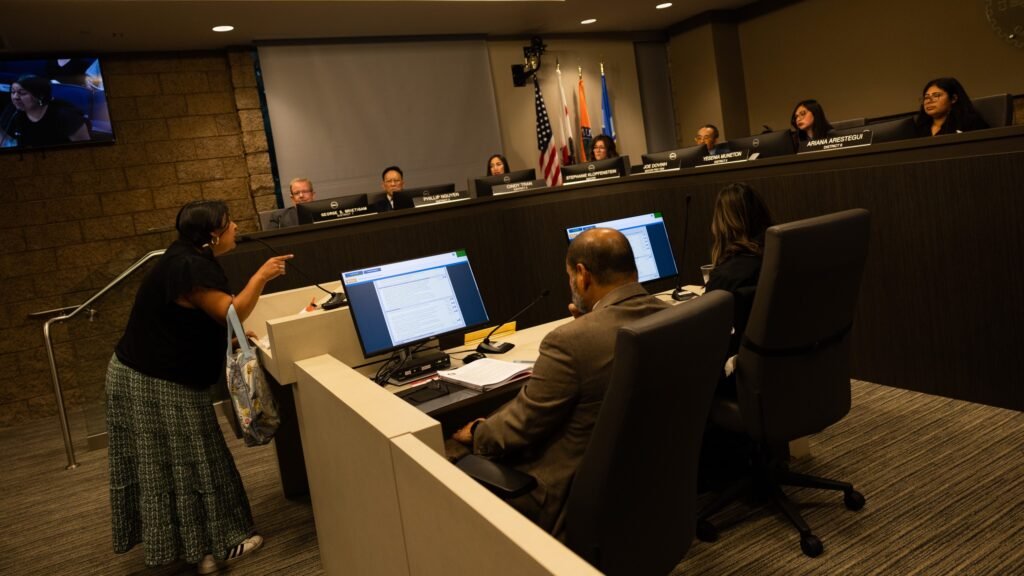As twilight descended on Garden Grove, California, the echo of impassioned voices filled the city’s council chambers, where a diverse group of community members, fearful for their loved ones, had gathered. Over 40 residents, clutching handcrafted signs and brimming with anxiety, pleaded for the city to act amidst increasing Immigration and Customs Enforcement (ICE) raids. In recent months, reports of families being wrenched apart—elderly residents tackled and dragged from the streets—have become the grim reality. Julie Nguyen, a local resident, spoke with urgency, “As each day passes, we are witnessing the cruel kidnapping of innocent families, and all we demand is transparency, accountability, and identification from law enforcement.”
Increasing ICE Raids Prompt Calls for Immigrant Aid Networks in Garden Grove
The unsettling rise in ICE operations across Orange County has stirred a palpable tension within this community, home to a sizable immigrant population, notably Asian and Latino residents. According to data from the U.S. Census Bureau, nearly 49% of Garden Grove’s population is foreign-born, with children of these immigrants often living in fear of their families being targeted. As ICE continues its aggressive tactics, a wave of grassroots activism has surfaced, prompting local leaders to reconsider their stance on immigrant rights.
Community Lobbies for Change
This urgency materialized at the recent city council meeting, where residents voiced their concerns regarding the lack of support and information related to the raids. Activists highlighted the need for transparent communication between local law enforcement and immigrant communities. Patricia Zavala, a community activist, stated, “We need the city to create public resource hubs—places where families can access legal support, know their rights, and receive updates on local detentions.” Her sentiments echoed the fears of many, tied to the unyielding reality of deportation risk.
Resident Demands for Notification Systems
- Immediate notification systems for local ICE raids
- Clear identification protocols for federal agents
- Establishment of resource hubs with legal assistance and food support
As tensions flared during Monday’s proceedings, some residents expressed skepticism toward proposals for an aid network. Tony Flores, a Garden Grove resident, suggested that such local initiatives might attract unwanted federal scrutiny, urging the council to comply with current immigration laws instead. His views, however, drew boos from many attendees, emphasizing the divide within the community on how best to approach the federal crackdown.
City Council’s Mixed Reactions
The Garden Grove City Council is grappling with the implications of these raids, facing pressure from constituents while also adhering to federal mandates. Councilman Joe DoVinh, a Vietnamese immigrant himself, advocated for thoughtful discussion before introducing relevant policies. “We understand that we cannot stop these agents from doing what they’re doing,” he noted, “but we must ensure that our community feels safe and supported.”
Relying on anecdotal and statistical evidence, experts suggest that municipal bodies could play a vital role in shielding immigrant communities during such federal operations. Dr. Lisa Hernandez, a sociologist who has studied immigration impacts in California, asserts, “Cities that actively engage in creating immigrant support networks do not only foster a sense of security but also contribute positively to community cohesion.” Her analysis indicates that support networks improve resilience among low-income families facing immigration-related fears.
Balancing Responsibilities and Rights
Councilwoman Ariana Arestegui echoed the sentiments of other board members, indicating that before any proposals could be put forth, it was essential to do the necessary research to understand the legal ramifications. “We must act responsibly and avoid misleading the community,” she stated. This sentiment reflects an awareness of the complex interplay between local governance and federal immigration policy.
Mayor Stephanie Klopfenstein assured residents that their voices were being heard. “We have a lot to process and think about,” she concluded, emphasizing the importance of collaboration in moving forward. The council’s responsiveness may indicate a potential shift in local governance aimed at better protecting vulnerable populations. However, the challenge remains significant, with the city walking a tightrope between community demands and federal compliance.
Grassroots Support and Wider Implications
Outside the city council, community efforts have surged, bolstered by the fear gripping families. The Garden Grove Unified School District has established a helpline to assist affected families by providing necessary resources ranging from legal advice to food distributions. These community-based initiatives reflect a broader movement within Orange County, as other cities, including Santa Ana and Anaheim, have already enacted programs aimed at supporting their immigrant populations.
While local leaders deliberate on their responses, residents have taken it upon themselves to establish their networks of aid. “We’re here to support one another. Food drives and legal workshops are popping up all over,” noted resident Crystal Cervantes, who emphasized the resilient spirit of the community amid adversity.
Future Actions by City Officials
The path forward remains uncertain as council members weigh their options. Acknowledging community fears, Councilman Phillip Nguyen stated the necessity of obeying state and federal laws while also recognizing the importance of supporting residents facing deportation fears. “We can’t issue ordinances that are in conflict with our federal authorities,” he said, yet “we can issue resolutions to stand with our community.”
As the contours of this contentious issue take shape within Garden Grove, the growing chorus of voices pleading for aid and transparency will likely continue to resonate, pushing city leaders toward action. Whether they will rise to the occasion and advocate for supportive policies remains the question in a city shaped by the very immigrant spirit it seeks to protect.









